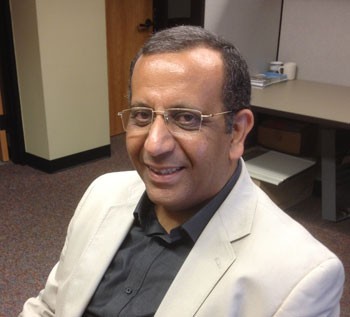The recent upheavals in Egypt have given the country’s churches “the opportunity to revisit the gospel we preach,” a leading Egyptian theological educator told the Presbyterian News Service in an exclusive interview here Sept. 15.
“Merely telling of God’s coming is not necessarily good news for sinners,” said Atef Gendy, president of Cairo’s Evangelical Theological Seminary. “By what we do people know the good news and even the smallest churches have done good and creative work during these troubles.”
Atef was referring to the Arab Spring of January 2011 which deposed longtime autocrat Hosni Mubarak, the subsequent election in June 2012 of Mohamed Morsi, and the “second revolution in late-June 2013 which toppled him.
The Arab Spring uprising “was hijacked by Islamic extremists,” Gendy said, “and within a year of Morsi’s election people were eating out of the garbage due to violence and instability.” Morsi’s regime also resulted in “a growth of anti-Christian fanaticism,” he added, noting that Christianity in Egypt dates back to about 700 A.D.
The Egyptian church has always face challenges, Gendy said, “and almost always faces discrimination, with periods of real persecution. During the Morsi period, he said, “we had restrictions on religious freedom, discrimination against women, media blasting of Christians and physical threats against buildings and businesses.”
The result, Gendy said, was “that youngsters broke away from religion in general. Atheism is a new phenomenon in Egypt, but the frustration and despair and ultimately the emigration of Christians is understandable.”
It all calls into question the meaning and role of Christianity in Egyptian society, Gendy said. “What does the cross and resurrection mean today? What does incarnation mean?”
Leaving the church or the country shouldn’t be an option, Gendy said. “The call to the church is to live among the people, not to escape when the evil comes but to act faithfully, demonstrating hope for transformation of the country,” he said.
In the wake of the upheavals of the last three years, Gendy continued, “the challenge is forgiveness and reconciliation balanced with law and justice. We have to ask, ‘Can religion be constructive without a theocratic model?’”
Asking such questions is “the basic vision of the seminary these days,” Gendy continued. “We are encouraging young people to be part of society, to be involved,” he said. “We are also training students in ministries of compassion ‘on the streets, in the slums.’ This is what it means to be a grass-roots church today.”
Gendy thanked the PC(USA) for its positions on Middle East issues, “particularly Israel-Palestine,” he said. “To be an advocate for the rights of everyone to live peacefully is the gospel message,” Gendy said, “and it has helped us in Egypt be a more effective voice for justice.”

